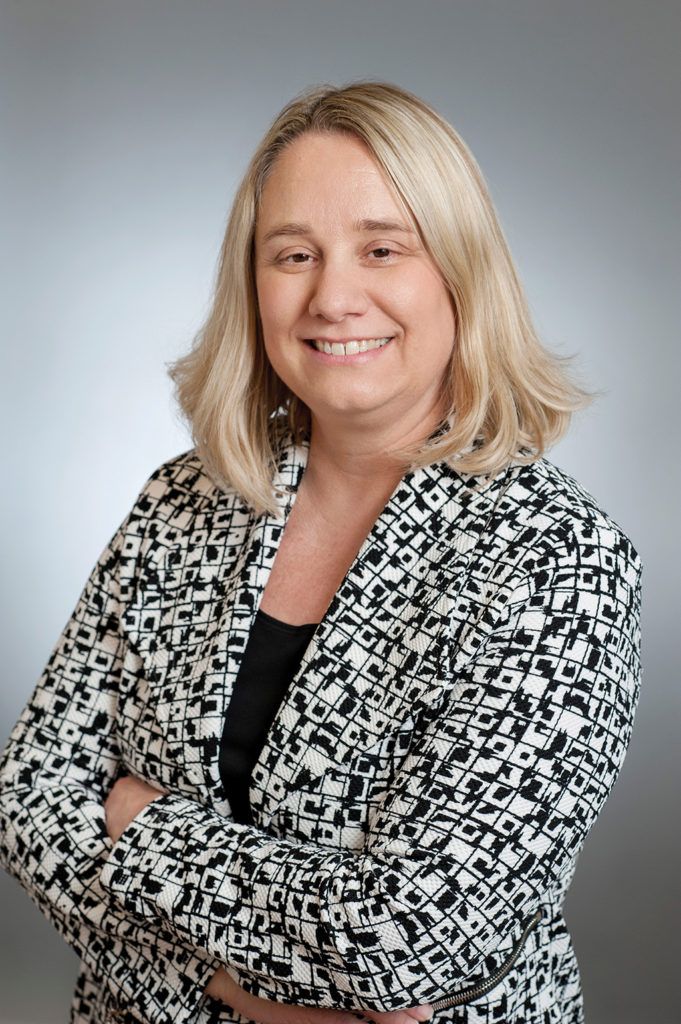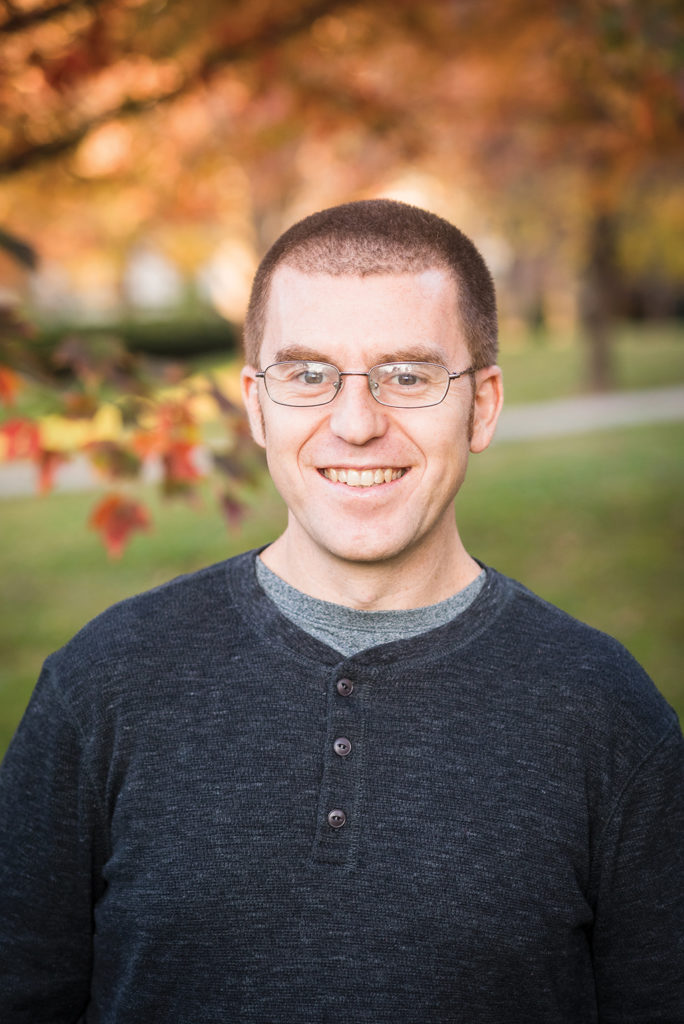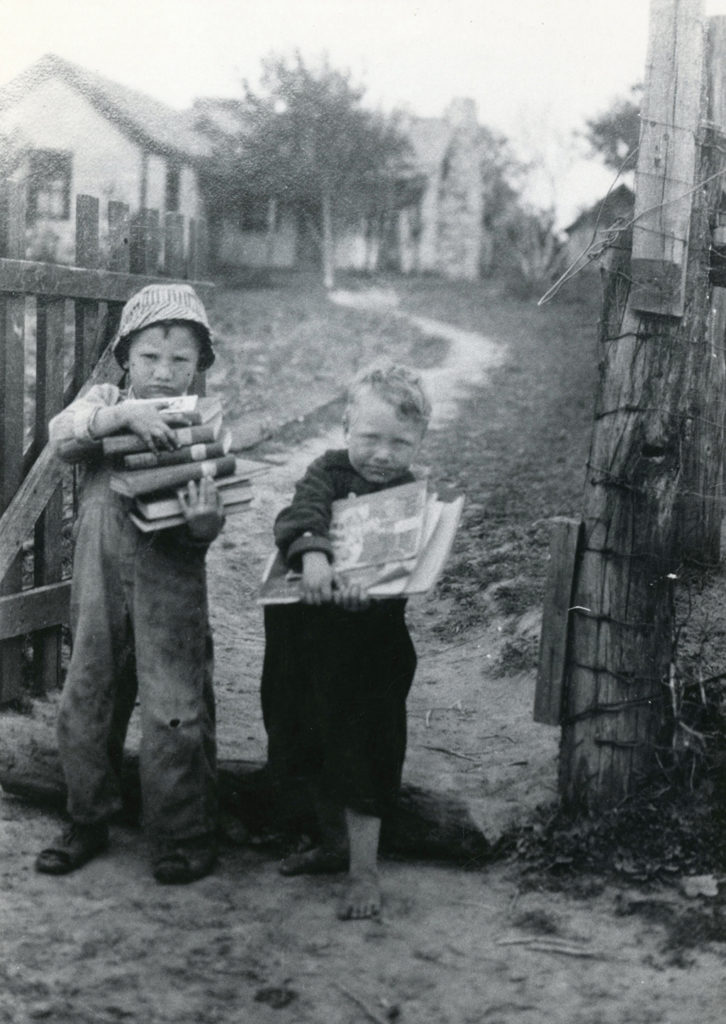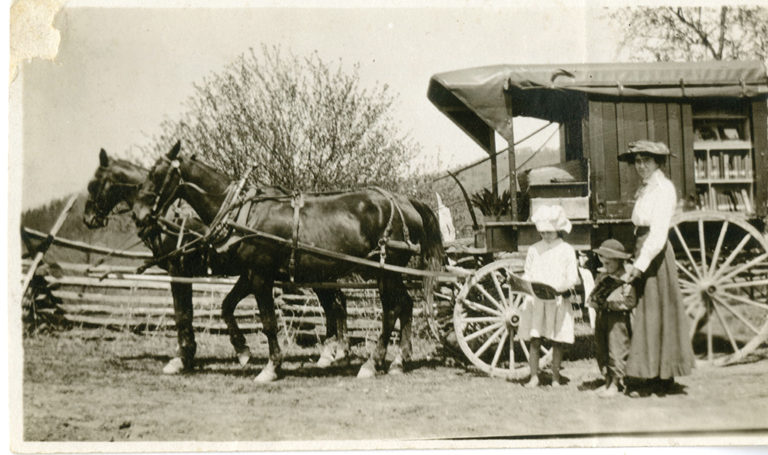Long before bookmobiles or Dolly Parton’s Imagination Library, Berea College librarians were steering covered wagons into rural mountain towns, bringing books to communities that lacked this precious resource. The wagons were outfitted with built-in wooden shelves, packed to the edges with hundreds of books and pulled by horses from the College farm.
The Berea book wagons, and later book cars, were one way that the College lived its commitment to serve the Appalachian region in the early 1900s. While Berea’s library extension service ended in 1943, its spirit can be seen in the work of Partners for Education (PFE). For the past 25 years, PFE has helped create equitable educational opportunities in Appalachian Kentucky by implementing programs such as GEAR UP, Upward Bound and Promise Neighborhoods. Through this work, PFE staff built the capacity of schools and communities to support approximately 50,000 students each year. In 2020, the staff determined to enhance its impact by launching the Rural Library Network to recognize the important role libraries play in rural communities.

The inspiration for the network came from several places. Growing up in Crab Orchard, Ky., PFE Executive Director Dreama Gentry ’89 knew firsthand just how valuable libraries were to rural communities. “Our closest public library was in Stanford—about 30 minutes away,” she recalled. “In the summers, I was able to visit there while my grandma was with her mom at the nursing home visiting. It was a great place that was an amazing escape.”
For most of her professional life, Gentry focused on building the capacity of school systems to support educational opportunity for rural students.
“A few years ago, I began thinking about how libraries are essential to rural education, and I remembered seeing a picture of the Berea book wagons,” Gentry said. “I began to wonder what that work would look like today.”
Her experience building Partners for Education gave her a solid grounding in the challenges facing educational systems in the region. What she needed was expertise in how libraries could help support that work.
Fortunately, Gentry had a strong working relationship with fellow Berean Shane Garver ’04, vice president of rural education for Save the Children. She first collaborated with Garver in 2011, when their organizations partnered on the very first Promise Neighborhood grant. Both organizations share a philosophy that lasting change must be place-based, with local leadership and with broad community involvement.

“Libraries are uniquely positioned to support place-based initiatives to improve community outcomes, Gentry explained. “In place-based initiatives, people who live and work together unite to address a challenge by finding the solutions that will work best for their communities.”
“We are national co-thought leaders in this work where ideas like the rural library network come to life, Garver added. “We figure out what we’re good at and set aside our own agendas for the betterment of rural America.”
Inspired by his hometown librarian, Garver recalls how Miss Pat saw potential in him and asked him to volunteer to read to younger kids, which helped him build his own sense of self and a desire to help others.
The Rural Library Network takes a two-pronged approach to supporting people working in rural libraries. First, there are monthly webinars and an annual online summit where rural librarians from across the country share best practices and learn from each other. Second, there is a year-long fellowship for 22 rural librarians that offers training and resources to increase third-grade reading outcomes in their communities. The fellowship focuses on third-grade reading because research has shown that children who read on or above grade level in third grade triple their chances of attending college.
While Gentry and Garver laid the foundation for the Rural Library Network, other Berea alumni are deeply involved with the work. Ashley Wagers ’11 returned to her hometown to serve as director of the Jackson County Public Library. She is a member of the Rural Library Network and has been a speaker for the monthly webinar series. Wagers credits her Berea College education for broadening her world view.
“Berea College made me 50 percent of who I am,” she said. “Berea taught me to ask questions, and that no matter who you are, your perspective is important.”
Wagers believes the public library plays a vital role in bringing relevant and timely information, resources and programming to her community. She also is a firm believer that a library’s success depends on its capacity to partner with other community organizations—the very foundation of the place-based model for the Rural Library Network. As a result, during her tenure in the past three years, the Jackson County library has housed a GED testing center, a Kentucky Skills U adult education course and a telehealth program for veterans. During the COVID-19 pandemic, the library created an online digital database, provided virtual cooking classes, offered online homeschool resources and organized drive-through distribution of books and food.

“During the shut-downs some businesses were considered essential,” Wagers said, “but libraries were vital.”
Wendy Johnston ’89, PFE program manager with Rural Impact–Networks, grew up in southern West Virginia where she volunteered at her local library every summer. After graduating from Berea College, she completed a master’s degree in library science and worked in many capacities in rural libraries in and around her home community. She returned to Berea last year to manage the Rural Library Fellowship. Johnston is passionate about Appalachian communities and the libraries that help fill important gaps for children and families.
“We can’t be all things for all people, but we can be the important things for people who need them,” Johnston said.
Johnston works with Dr. Regina Washington ’93, the new director of Rural Impact–Networks. Washington, who has spent her career studying and addressing public health disparities, hopes to advance rural education by providing a larger platform to share ideas, lift up diversity of practices and systematically address disparities.
“Growing up in Martinsburg, W. Va., the library was a great equalizer for me,” Johnston said. “My mom always instilled in me that ‘education is the key,’ and my public library provided me with resources and research essential for my school assignments.” Ensuring equitable access to educational opportunity has long been the motivating force behind the work of many Bereans. So, it’s not surprising that 100 years after the book wagon project ended, a network of Berea alumni—working in national rural-focused organizations and leading local libraries in their own communities—is developing the creative vision to continue these efforts in the 21st century.


